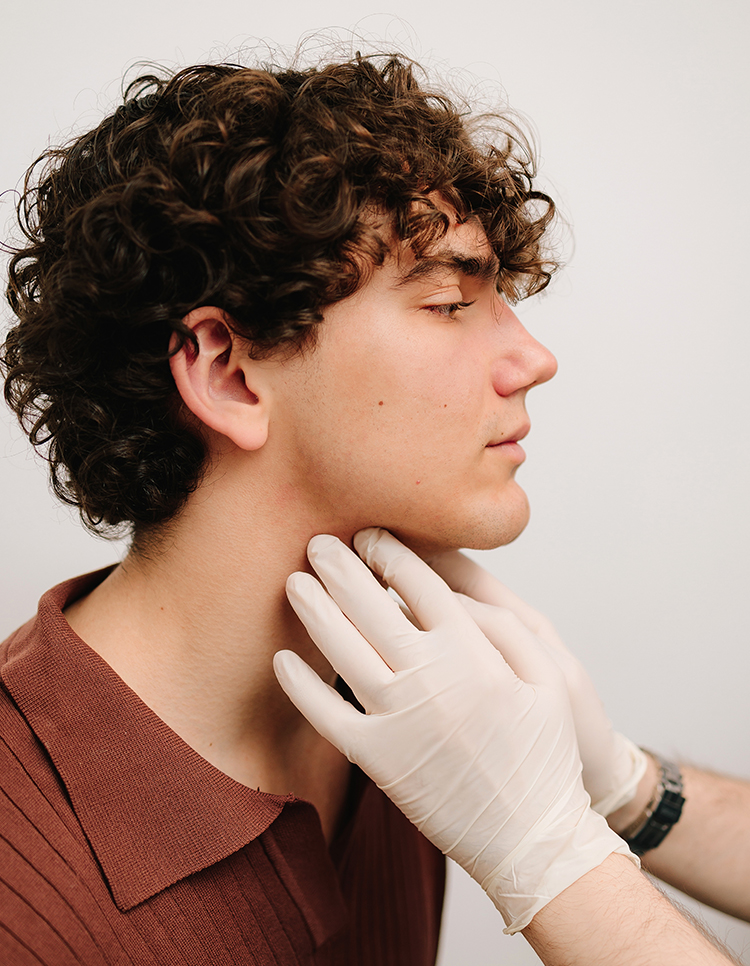
Salivary Gland Masses
Parotid, Submandibular, Sublingual Glands
Salivary gland masses refer to abnormal growths or swellings that develop in one or more of the salivary glands, including the parotid, submandibular, and sublingual glands. These masses can be benign or malignant, with various causes ranging from infections to tumors. Salivary gland masses may cause discomfort, facial asymmetry, and functional issues such as difficulty swallowing or speaking. While many of these masses are noncancerous, early diagnosis is essential to rule out malignancy and to determine the most appropriate treatment.
Becker ENT & Allergy in Philadelphia, PA, offers expert evaluation and treatment for salivary gland masses, utilizing advanced diagnostic tools and surgical techniques. Our team of board-certified otolaryngologists provides comprehensive care to ensure optimal patient outcomes. If you are experiencing swelling, pain, or changes in saliva production, it is important to seek medical attention promptly.
What Are Salivary Gland Masses?
Salivary gland masses are abnormal growths or enlargements that can develop in the salivary glands, which are responsible for producing saliva to aid in digestion and oral health. These masses can be caused by a variety of conditions, including infections, cysts, benign tumors, and malignant tumors. The parotid, submandibular, and sublingual glands are the three major salivary glands where these masses most commonly develop:
Parotid Gland Masses
The parotid glands, located in front of and just below each ear, are the largest salivary glands. Masses in this area are often benign, with pleomorphic adenoma being the most common type. However, approximately 20% of parotid gland tumors are malignant, necessitating careful assessment.
Submandibular Gland Masses
Situated beneath the jawline, the submandibular glands can develop masses due to chronic infections, sialolithiasis (salivary stones), or tumors. While benign tumors like pleomorphic adenomas are common, malignant tumors can also occur in this gland.
Sublingual Gland Masses
The sublingual glands, located under the tongue, are less commonly affected by masses. When they do occur, these masses may result from cysts, infections, or tumors, with a higher likelihood of malignancy compared to other salivary glands.
Types of Salivary Gland Masses
Salivary gland masses can be classified into different types based on their underlying cause and characteristics. While some masses are benign and may not require immediate intervention, others can be malignant and necessitate prompt medical attention. Understanding these types can help in identifying the best course of treatment.
Benign Tumors
These include pleomorphic adenomas and Warthin’s tumors, which are noncancerous but may require removal if they cause discomfort or continue to grow.
Malignant Tumors
These include mucoepidermoid carcinoma and adenoid cystic carcinoma, which require prompt treatment due to their aggressive nature.
Cysts
Fluid-filled sacs that can develop due to blockages or infections within the gland.
Sialolithiasis (Salivary Stones)
Hardened mineral deposits that can cause swelling and pain.
Inflammatory Conditions
Conditions such as sialadenitis (infection of the salivary glands) can lead to swelling and the formation of abscesses.

Causes of Salivary Gland Masses
Salivary gland masses can develop for various reasons, including both benign and malignant conditions. Understanding the underlying cause is crucial for determining the appropriate treatment plan. Some common causes include:

Symptoms of Salivary Gland Masses
Salivary gland masses may cause a variety of symptoms, depending on their location and underlying cause. Some symptoms may develop gradually, while others may appear suddenly, especially in cases of infection or obstruction. Early recognition of these symptoms can lead to prompt diagnosis and effective treatment. Common symptoms include:



Risk Factors for Developing Salivary Gland Masses
Several factors may contribute to the development of salivary gland masses, including lifestyle habits, environmental exposures, and genetic predisposition. While some risk factors, such as aging and genetics, cannot be controlled, others, like smoking and radiation exposure, can be mitigated to reduce the likelihood of developing these masses. Understanding these risk factors can help individuals make informed decisions about their health. These risk factors include:
Consultation and Diagnosis
A comprehensive evaluation is essential for accurately diagnosing salivary gland masses and determining the appropriate course of treatment. The diagnostic process begins with a thorough medical history and physical examination, followed by advanced imaging techniques to assess the characteristics of the mass. In many cases, a biopsy is necessary to confirm whether the mass is benign or malignant.
At Becker ENT & Allergy, we conduct a thorough evaluation to diagnose salivary gland masses accurately. This includes:
Treatment Options
The treatment approach for salivary gland masses depends on the type, size, and location of the mass, as well as whether it is benign or malignant. Some cases may require surgical intervention, while others may be managed with minimally invasive procedures or targeted therapies. A personalized treatment plan is developed for each patient to ensure the best possible outcome.
Treatment options may include:
Prevention
While not all salivary gland masses can be prevented, reducing risk factors can help. Avoiding tobacco, staying hydrated, and maintaining good oral hygiene may lower the risk of developing certain conditions.
Why Choose Becker ENT & Allergy?
At Becker ENT & Allergy, our team of board-certified otolaryngologists brings years of experience in diagnosing and treating salivary gland masses with precision and care. We use state-of-the-art imaging and minimally invasive techniques to ensure accurate diagnoses and effective treatment options. Our commitment to patient-centered care means that we prioritize your comfort and health at every step, from diagnosis to recovery.
Becker ENT & Allergy in Philadelphia, PA, provides expert care for salivary gland disorders with advanced diagnostic and treatment options. Our team is committed to personalized patient care and optimal outcomes.
Location and Contact Information
Becker ENT & Allergy proudly serves patients in Philadelphia, PA, and the surrounding areas. Our conveniently located office offers a comfortable environment and cutting-edge technology for diagnosing and treating salivary gland conditions. Contact us today at one of our convenient Philadelphia locations:
Walnut Street Office
1608 Walnut St Suite 902
Philadelphia, PA 19103
Phone: (215) 929-8301
South Street Office
1740 South St Suite 401
Philadelphia, PA 19146
Phone: (215) 671-6330
Frequently Asked Questions About Salivary Gland Masses
For expert evaluation and treatment of salivary gland masses, schedule a consultation with Becker ENT & Allergy today.


